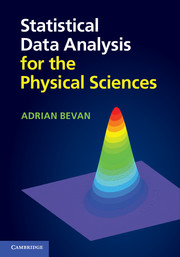
-
Select format
-
- Publisher:
- Cambridge University Press
- Publication date:
- 05 July 2013
- 09 May 2013
- ISBN:
- 9781139342810
- 9781107030015
- 9781107670341
- Dimensions:
- (247 x 174 mm)
- Weight & Pages:
- 0.61kg, 229 Pages
- Dimensions:
- (247 x 174 mm)
- Weight & Pages:
- 0.46kg, 229 Pages
You may already have access via personal or institutional login
Book description
Data analysis lies at the heart of every experimental science. Providing a modern introduction to statistics, this book is ideal for undergraduates in physics. It introduces the necessary tools required to analyse data from experiments across a range of areas, making it a valuable resource for students. In addition to covering the basic topics, the book also takes in advanced and modern subjects, such as neural networks, decision trees, fitting techniques and issues concerning limit or interval setting. Worked examples and case studies illustrate the techniques presented, and end-of-chapter exercises help test the reader's understanding of the material.
Reviews
‘This is a very useful compendium of the statistical techniques used in high energy physics experiments. I would recommend it particularly to undergraduate and PhD students entering for the first time our field.’
Riccardo Faccini - Sapienza Università di Roma
‘This is a very useful book on statistical techniques, suitable for advanced undergraduates or graduate students in the physical sciences. Starting from the basics of probability, the book reviews a range of current techniques in areas like hypothesis testing, assignment of confidence limits and multivariate analysis. Many case studies are presented, including several from the author's own speciality of particle physics, though the book is relevant for any field where careful interpretation of data is needed.’
David Ward - University of Cambridge
‘Adrian Bevan’s book is more than just an introduction to statistics. His carefully crafted, well thought out book covers a wide range of topics, from basic concepts up to modern techniques: I highly recommend it.’
Francois Le Diberder - CNRS/IN2P3/LAL
‘This is an excellent text on the [principles] of statistics and their practical applications. It incorporates many useful and instructive examples, both in the text as well as in the exercises at the ends of the chapters … There is a primer on set theory and an exceptionally clear and unbiased discussion of the differences between frequentist and Bayesian approaches. In addition to covering the basics, [the book] also includes a chapter discussing and comparing a wide variety of multivariate tests.’
Brian Meadows - University of Cincinnati
Contents
Metrics
Full text views
Full text views help Loading metrics...
Loading metrics...
* Views captured on Cambridge Core between #date#. This data will be updated every 24 hours.
Usage data cannot currently be displayed.
Accessibility standard: Unknown
Why this information is here
This section outlines the accessibility features of this content - including support for screen readers, full keyboard navigation and high-contrast display options. This may not be relevant for you.
Accessibility Information
Accessibility compliance for the PDF of this book is currently unknown and may be updated in the future.


